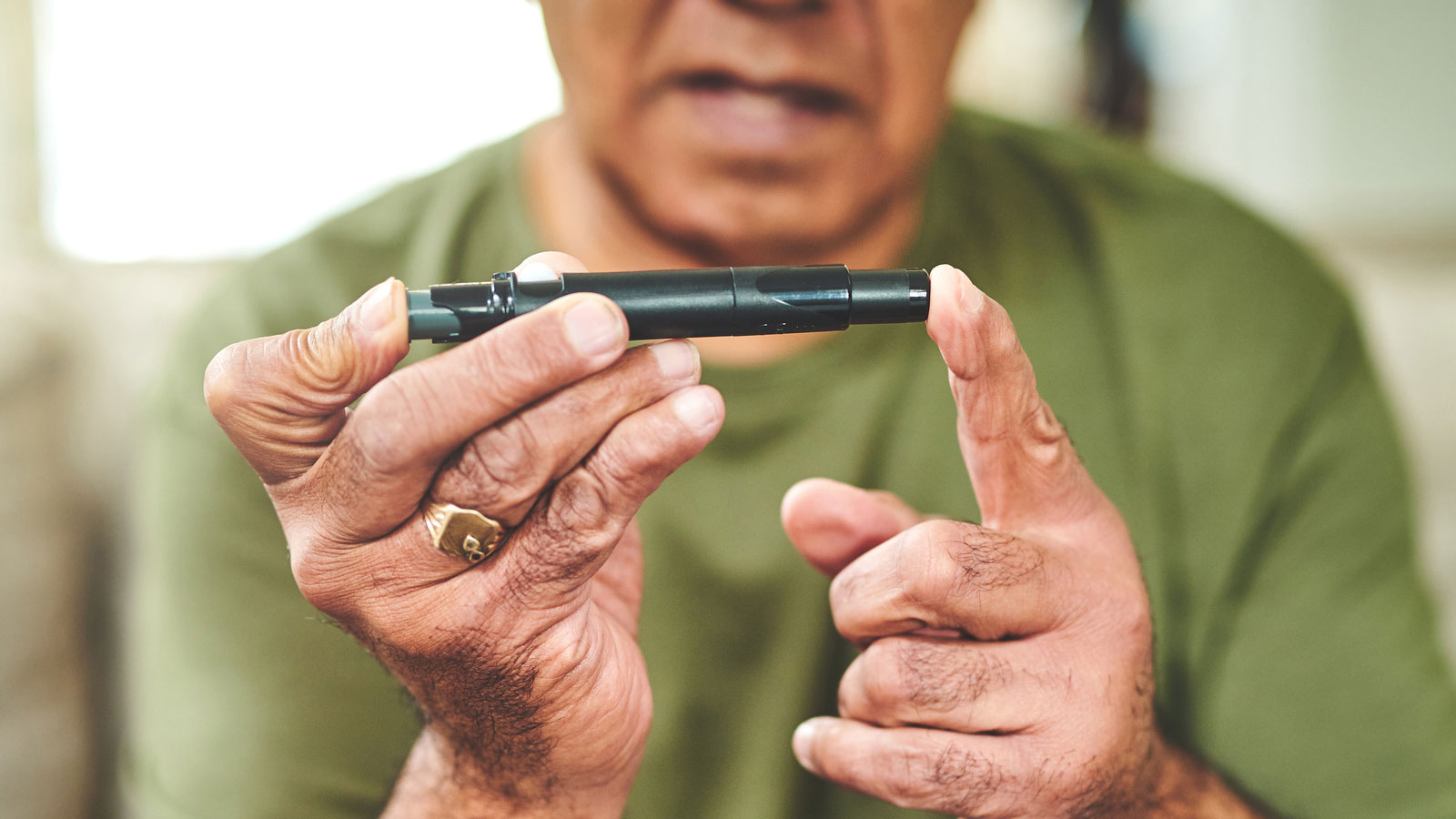Why on Earth Am I Always So Cold?
Always feeling cold? It could be your body’s natural temperature regulation—or a sign of something deeper. Learn common causes and ways to warm up.

By: Patricia M. Bernhardt, APN, Virtua Primary Care
Are you that person who always packs a sweater “just in case?” Perhaps you’re that someone who walks around the house wrapped in a blanket? Or maybe you always seem to find yourself shivering in the office when everyone else seems perfectly comfortable.
If this sounds familiar, you’ve probably wondered: “why on earth am I always so cold?”
The truth is, sometimes being cold all the time is just a quirk of your body's temperature regulation. However, other times, it can indicate something happening beneath the surface.
Here are some common reasons you might constantly feel chilly, and a few simple tips to help you warm up.
Why You Might Always Feel Cold
Circulation concern
Your blood acts as your body’s internal heating system. When circulation slows—because of long periods of sitting, diabetes, or peripheral artery disease (PAD)—your hands and feet are usually the first to feel icy or numb. If these symptoms don’t improve, it’s a good idea to talk with your doctor. Addressing circulation issues early can help protect your overall heart and vascular health.
Low body weight
Body fat helps insulate and trap heat. If your body mass index (BMI) is on the lower side, your body may lose warmth more quickly because there’s less padding to trap the heat. This can result in you feeling colder than most.
Hormonal shift
Hormones play a significant role in regulating body temperature. For example, an underactive thyroid (hypothyroidism) can slow your metabolism, causing you to feel chilly. Women going through menopause often experience body temperature swings that can range from hot flashes to sudden chills.
Anemia
Anemia, especially iron-deficiency, means your red blood cells can’t carry oxygen efficiently through your body. This can leave you feeling cold, especially in your hands and feet.
Dehydration
Dehydration doesn’t just make you tired – it can also throw off your body’s ability to regulate heat. If you’re not drinking enough water, you may find yourself shivering more than usual.
Everyday lifestyle habits
Sometimes the explanation for why you’re always so cold is simple. Skipping meals, not getting enough movement, or spending hours in an over-air-conditioned space can leave you reaching for a sweater in any season.
Tips to Stay Warm and Comfortable
Layers are your friend:
Instead of one big sweater, try lightweight, breathable layers that give you flexibility. Fabrics like fleece or merino wool can add warmth without feeling too bulky.
Keep moving:
A quick walk around outside or a five-minute stretch break at your desk can help boost blood circulation and warm you up.
Eat balanced meals:
Fueling your body with regular, balanced meals provides it with the energy it needs to maintain its temperature and stay warm. Bonus: a warm drink or a spicy meal can give you that boost of warmth in cooler seasons.
Drink water:
Cold water may not sound appealing when you’re already cold, but staying hydrated helps your body regulate its temperature more effectively.
Stay prepared:
Keep a blanket at your desk, pack thick socks in your bag, or use a safe space heater for your home or office if the AC runs too cold.
Small lifestyle changes can often help; however, if you’ve tried these tips and you’re still always cold, regardless of the season or how many layers you wear, it may be more than just a quirk. Persistent cold sensitivity can sometimes indicate issues such as thyroid problems, anemia, or circulation disorders.
Schedule an Appointment with your Primary Care Physician
If you’re concerned about feeling cold all the time, schedule a visit with a Virtua Health Primary Care physician to discuss.
There's So Much More to Explore
Discover expert insights, inspiring stories, health tips, and more by exploring the content below!

Can Your Gut Health Affect Your Heart?

Understanding Food Addiction: Causes, Symptoms, and Recovery Strategies

At-Home Colon Cancer Tests vs. Colonoscopy: Which Screening Option Is Right for You?

8 Signs It's Time to See a Gastroenterologist

How the Unique Stages of a Woman's Heart Affect Her Health

What To Eat Before And After Your Workout

HeartTalk Magazine

Healthy Takeout Made Easy: What to Order for Better Nutrition

How Weight-Loss Surgery Can Improve Diabetes, Heart Health, and More

How to Achieve Your Health Goals This Year

Why Weight Loss Plateaus Happen (And What to Do Next)

Knee Replacement Rehab: 7 Exercises to Restore Your Strength and Range of Motion

COPD vs. Asthma: Understanding the Difference in Symptoms

Bioidentical Hormone Replacement Therapy Pellets: Relief for Menopause and Andropause Symptoms

Why Is Sex Painful During Pregnancy? Pelvic Congestion Syndrome Explained

Don't Drink Alcohol? You Could Still Get Fatty Liver Disease

What Is the Difference Between Palliative Care and Hospice Care?

How to Exercise Safely with Asthma: Tips, Triggers, and Rescue Inhaler Use

How to Relieve Bloating Fast: Simple Tips for Quick Comfort

How to Tell the Difference Between Cold, Flu, and COVID-19

Jill Travels From Delaware to South Jersey for Advanced Lung Care

4 Exercise Tips to Help You Reverse High Blood Pressure

From Exhaustion to Empowerment: Tracy's Hormone Replacement Therapy Success Story

How to Bounce Back From Holiday Overeating

Why on Earth Am I Always So Cold?

Timely Heart Care During a Heart Attack Helps Joe Feed the Community

Allegra Is Thriving With Crohn's Disease

The Best and Worst Foods for Acid Reflux

How to Manage IBS Symptoms and Feel in Control Again

5 Types of Lung Disease: Symptoms, Causes, and Prevention Tips

Foods to Enjoy and Avoid for GLP-1 Heartburn

3 Reasons Why Now's the Time to Find Relief From Varicose Veins

Baseball Coach Turns Male Breast Cancer Surprise into Personal Mission

The Brain Health Checklist: 11 Questions Everyone Should Ask

From Caregiver to Patient: Robotic Surgery Relieves Teresa's Knee Pain

How to Get and Stay Healthy This Fall

How to Reverse Prediabetes and Prevent Type 2 Diabetes

Young Breast-Cancer Survivor Has New Hope for Healthy Future

Is Cancer Hereditary? What You Need to Know About Your Genetic Risks

Tara's Story: From Debilitating Uterine Fibroid Pain to a Half-Marathon Medal

Is Your Post-Pregnancy Belly Bulge a Sign of Diastasis Recti?

Fall Vegetables: The Health Benefits and Recipes to Try This Season

How to Curb Nighttime Snack Cravings

IBS and Alcohol: Can You Still Enjoy a Drink?

Focus on Mental Health Is Key Part of Andrew's Weight-Loss Journey

What You Need to Know About Epilepsy

'Feeling Joy Again': ECT Brain Stimulation Therapy Restores Ashley's Well-Being

3 South Jersey Farmers Markets You Must Visit This Fall

Not Just for Wrinkles: Botox Injections Promote Improved Bladder Control

Easy, Healthy Lunch Ideas for the Beach

How to Stay Cool and Prevent Heat Illness All Summer Long

What Happens to Your Body When You Don't Get Enough Sleep?

5 Key Facts About Proton Therapy for Cancer Treatment

Mood Swings vs. Mood Disorders: Know the Signs and Get Help
Are emotional ups and downs disrupting daily life? Learn common signs of mood disorders, and when to talk to a doctor about diagnosis and treatment options.

4 Foolproof Pelvic Floor Strengthening Exercises for Women

What to Expect During Perimenopause

Protect Yourself From Tick Bites and Lyme Disease

5 Light and Healthy Recipes Perfect for Spring

6 Tips to Tame Your Spring Allergies

Do You Know the Signs and Symptoms of Uterine Fibroids?

How Are Uterine Fibroids Treated?

How Do You Manage the Side Effects of Weight-Loss Medications?

Which Weight-Loss Option is Best for Me?

A Woman’s Four-Step Guide to Fight Back on Back Pain

What You Need To Know About Carpal Tunnel Syndrome

The Truth About Menopause, Weight Gain, and Belly Fat

Shedding Light on Lesser-Known Menopause Symptoms and Solutions

Debunking The Myths About Vaginal Dryness
Inside Look at Blood Vessels Aids PAD Treatment
Denise Davis: Pay Attention to Your Heart Health

What You Need To Know About Stroke Treatment

10 Smart Ways to Manage Your Diabetes

Signs You May Have Chronic Kidney Disease

5 Essential Winter Foot Care Tips When You Have Diabetes

Sweet Music: Trust, Teamwork Save Justin from Heart Attack

Complex Heart Surgery Nets James a Lifelong Friend

Your 10-Point Plan to Avoid Winter Weight Gain

Hepatitis C Kidney Transplant a Blessing For Lee Manns

7 Reasons Why You Want Your Surgeon to Be an Expert in Robotics

Colitis Symptoms Under Control, Jennifer Is ‘Living My Best Life’

How Do I Care for a Wound that Won't Heal?

Five Back Pain Risk Factors That You Should Know

Is My Back Pain Normal, or Is It Spinal Stenosis?

Augmented-Reality Surgery Has Bobby Back on Stage, Rocking His New Hip

Robotic Hernia Surgery Combines Innovative Techniques With Faster Recovery Times

How Does Breast Density Affect Your Mammogram?

Menopause: New Insights Into the Power of Hormone Replacement Therapy

Signs You Should Get Treated For Vein Problems

One New Heart Valve Saves Two Lives in the Tritten Family

What You Need to Know About Heart Failure
Lung Valve Surgery Relieves COPD, Emphysema Symptoms

Lung Screening, Robotic Technologies Get Pat Kicking Up Her Boots Again

Breast Cancer Diagnosis Inspires Catherine to Help Others

Jasmine’s On-Air and Pain-Free After Gallbladder Surgery

What is the 80/20 Diet Rule?

When Should I See a Doctor About My Knee Pain?

Quick Action Leads to Jesse's Recovery From Stroke

A Non-Athlete’s Guide to Shoulder Overuse Injuries
Shoulder problems aren’t limited to athletes. Virtua orthopedic surgeon Sean McMillan, DO, explains shoulder overuse injuries and prevention in this article.

Put Lower Back Pain Behind You With This Ten-Step Guide

Wide-Awake Hand Surgery Speeds Recovery, Puts Control in Patients' Hands

South Jersey Veteran Thrives After Cross-Country Kidney Donation

3 Ways to Avoid Knee Pain

When Should I See a Doctor for My Hip Pain?

When Should I See a Doctor About My Shoulder Pain?

Is My Back Pain Normal, or Is It Sciatica?

Is My Back Pain Normal, or Is It a Herniated Disk?

When Is It Back Pain, and When Is It Something More?

Watchman Heart Device: a Technological Breakthrough for Blood Clot Prevention

Albert's Emergency Cardiac Surgery Is a 'Story of a Lifetime'

What Can I Do Right Now About My Aching Back?

How Do I Get Rid of This Back Pain for Good?

When Should I Be Worried About My Neck Pain?
Advanced Heart Failure Therapies Get Bernadine Back to Full Speed

Sarah Wins Back Her Health After Crohn's Disease Diagnosis

Overcoming Addiction, Philip Now Sees More Positive Side to Life
Firefighter's Successful Lung Cancer Care at Virtua
A Lung Screening Put Teresa Back in the Race

A Breast Self-Exam Saved Kristen's Life

Early Treatment is Best to Relieve Hemorrhoid Symptoms

The Top 10 Foods For A Healthy Diabetes Diet

Keeping the Beat: Advanced Heart Surgery for Aortic Aneurysm

Are You At Risk For Chronic Kidney Disease

Local Pastor Makes Kidney Health Mission of Ministry

What’s the Difference Between Type 1 and Type 2 Diabetes?

Is This the Right Time in Your Life for Bariatric Surgery?

All for Bear: Dan Loses Weight to Be His Son’s Kidney Donor

Forget Dieting: Find Your Eating Pattern

Hyperbaric Wound Therapy Puts Joette Back in Motion

Robotic Hernia Repair Renews David's Active Lifestyle

